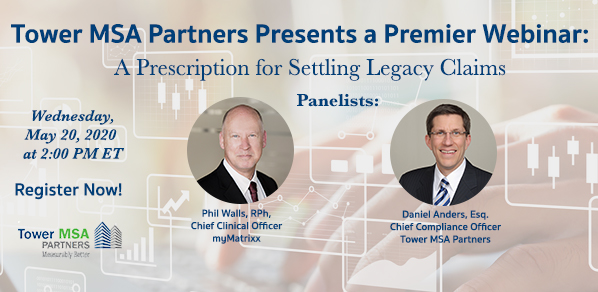On April 20, 2020, Tower MSA Partners responded to CMS’s request for comments on its proposed regulation for Section 111 Mandatory Insurer Reporting civil money penalties (CMPs). Please see Tower’s Feb. 18 post on CMS’s proposal.
Tower’s comments mirrored those submitted by the National Alliance of Medicare Set-Aside Professionals (NAMSAP) of which Tower is a member. As Co-Chair of NAMSAP’s Policy & Legislative Committee, I had the privilege of working on comments with my committee Co-Chair Annie Davidson, NAMSAP President Ciara Koba, and our fellow NAMSAP board members. Many thanks to Jill Dulich of the National Council of Self-Insurers and Doug Holmes of Strategic Services on Unemployment & Workers’ Compensation for sharing their invaluable Comment drafts.
Tower’s full comments can be found here and are summarized below:
Penalty Threshold for Failure to Report / Delayed Reporting – Part 402.1(c)(22)(i)
Per the proposed rule, subject to the good faith efforts provision, a penalty is imposed for an RRE that “fails to report any beneficiary record within 1 year from the date of settlement, judgment, award, or other payment.” Recognizing that human and technical error will occur, we recommended CMS implement a 10% threshold for error tolerance per RRE.
The 10% would be based upon the number of Total Payment Obligation to Claimants (TPOCs) reported in a quarter (including off-cycle reporting).
Penalties Imposed for Failure to Report / Delayed Reporting – Part 402.105(b)(3)(i)
The proposal states that failure-to-report penalties will be up to $1,000 per calendar day, adjusted for inflation, for a maximum penalty of $365,000 per calendar year.
The proposal did not indicate whether CMS will use the discretion provided by the SMART Act to impose a penalty of “up to” $1,000/day. If CMS uses this discretion, then what criteria will be used to determine if the penalty should be $1/day, $500/day or $1,000/day?
We submitted that CMS should incorporate mitigating factors, already found in the code of federal regulations. These would define CMS’s discretion in imposing penalties and provide RREs that face penalties the criteria needed to respond to potential penalties.
Additionally, we recommended that if Medicare made no conditional payment demands that no penalties should be imposed.
Data Contradicts Recovery – Part 402.1(c)(22)(ii)
The proposed rule addresses the possibility that an RRE’s response to CMS’s recovery efforts may contradict the its Section 111 reporting. A penalty would be calculated based on the number of calendar days that the entity failed to accurately report timely updates to beneficiary records.
This means that an NGHP could face a penalty of up to an adjusted $1,000 per calendar day of “noncompliance” for each individual, for a maximum annual penalty of an adjusted $365,000 for each individual for which required information should have been submitted.
CMS is saying it will potentially penalize RREs millions of dollars for correcting their data after inconsistencies are found despite the fact that such errors cause the agency minimal monetary harm.
We urged CMS to either withdraw this type of penalty or impose penalties that are proportional to the harm caused to Medicare as a result of the reporting contradictions.
“Safe Harbor” for Data Collection from Beneficiaries – Part 402.1(c)(22)(A)(2)
The proposed rule provides an exemption for those situations where a claimant refuses to provide their Social Security Number or Medicare Beneficiary Identifier. Yet, it mandates three attempts to obtain this information before allowing the exemption.
We requested that CMS eliminate the mandatory minimum number of communications with claimants. Instead, we asked it to simply require that the RRE make good faith efforts to secure needed reporting information.
Informal Notice – D. Summary of Public Comments #8
CMS stated that its informal notice process will provide the RRE 30 calendar days to respond with any mitigating information prior to the issuance of a penalty notice.
We proposed that the RRE have 120 calendar days post receipt of the informal notice to respond.
Prospective Application – D. Summary of Public Comments #6
CMS advised the application of the final regulation will be prospective. However, after the regulation implementation date, much of the reported Section 111 data will be retrospective to that date. While this will taper, corrections will occur and there is a potential for conditional payment recovery involving retrospective data.
We requested CMS better define what they mean by prospective application of the rule.
Five Year Statute of Limitations – D. Summary of Public Comments #7
In its supporting summary, CMS takes care to outline that these penalties would be imposed within the existing CMP five-year statute of limitations. That limitations period, CMS says, is triggered when the agency identifies the non-compliant action.
We responded that CMS’s interpretation is incorrect. The correct interpretation is that the statute of limitations starts with when the non-compliant action occurred, not when CMS identifies the non-compliance action. In other words, if a TPOC was not reported when required in 2020, the statute of limitations would expire in 2025.
Further, we asserted that the five-year statute of limitations is inapplicable to Section 111 penalties; instead the three-year statute of limitations found in the Medicare Secondary Payer Act applies.
ALJ and Departmental Appeals Board Backlog Concerns – D. Summary of Public Comments #5
Under the proposed rule, CMS allows for appeals post the notice of the penalty. However, as we have seen with appeals for conditional payment demands, it can take several years to have a hearing before an administrative law judge (ALJ).
Our question to CMS is whether this same appeals process, along with timeframes, will be utilized for penalties appeals. Further, we inquired as to whether CMS will be using the Treasury offset program to collect penalties.
Implementation of Final Rule
Finally, given the diversion of resources by many RREs to respond to the COVID-19 pandemic, we requested that CMS not implement a final rule until at least 1/1/2021.
If you have any questions about CMS’s proposed rule or these comments, please contact me, Dan Anders, at (888) 331-4941 or daniel.anders@towermsa.com.





